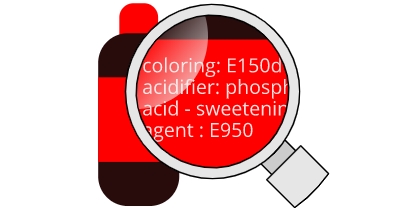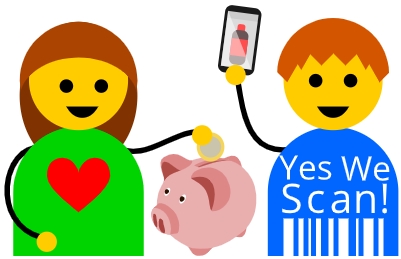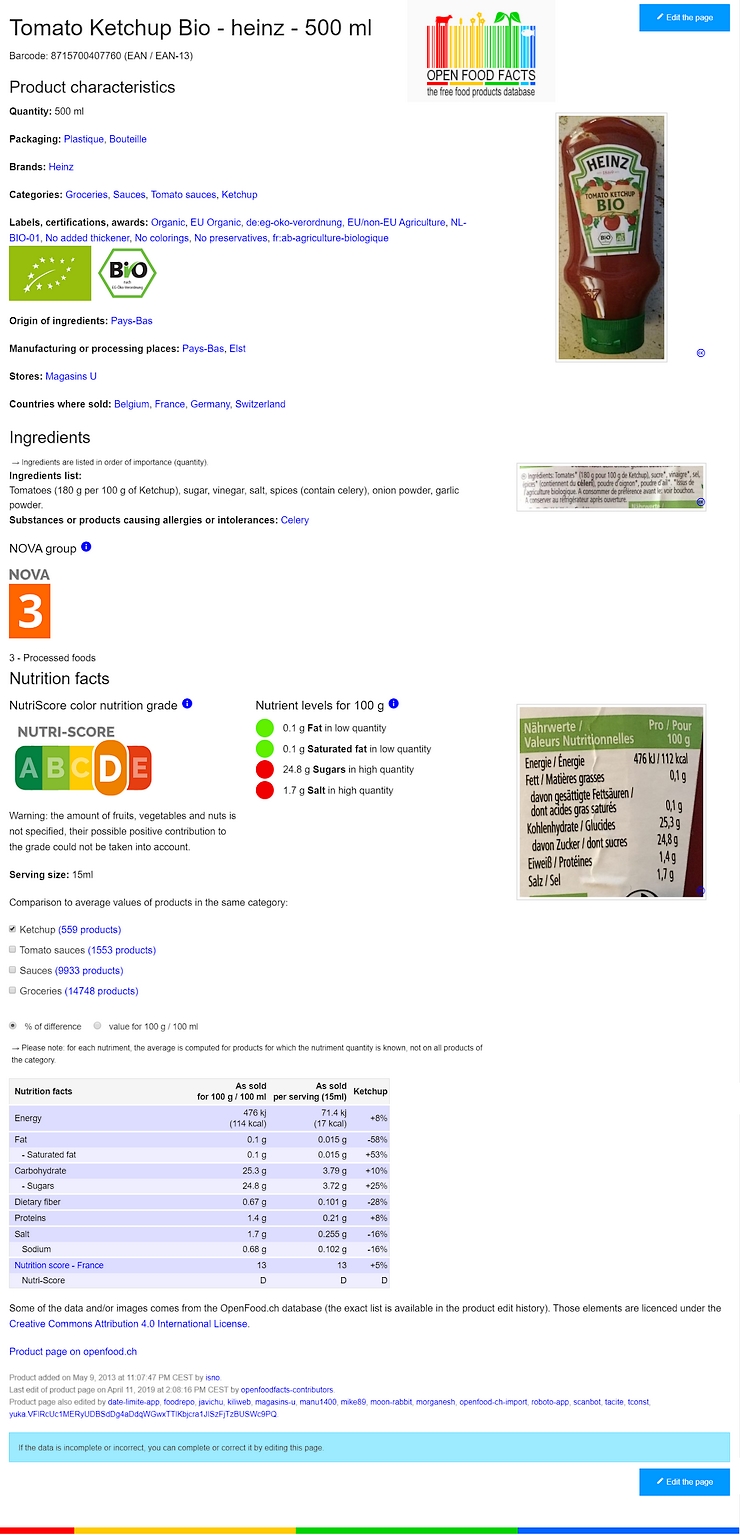Apps that processors cannot afford to ignore
Guiding the consumer, influencing the practices of the industrial sectors
As a consequence or a foreseeable extension of the emergence of this type of platform, the initial simple information process of Open Food Facts has evolved and has been relayed in terms of proposals for help with comprehending information (Nutri-Score, Nova, etc.).
Since its creation, Open Food Facts has been stating that it has developed a real ecosystem for the reuse of its data. Since the Open Food Facts collaborative database is published as open data, the information can be used just as freely for commercial, educational or scientific purposes, and has already been mentioned as a resource in many research publications, whether in the fields of computer science or nutrition studies.
Several information sites, start-ups, research laboratories, higher education professionals, and many food-related applications use Open Food Facts data daily: Yuka, Foodvisor, Scan Eats, Y'a Quoi Dedans (Super U), BuyOrNot, Kwalito nopalm.org, ScanUp, Date Limite MesInformationsNutritionnelles, ...
 Other structures have decided to go even further: the initial approach of Open Food Facts has allowed the emergence of comparative tools and purchasing-decision resources whose scope far exceeds that of the databases from which they get their information. Launched in 2017, the smartphone app Yuka awards a score out of 100 and an appreciation, from "excellent" to "bad", to food products according to their nutritional quality and the presence of additives. The app targets consumers concerned about their diet who want to know the composition of a given product. The user places the camera of their phone in front of the barcode of the product, then the application displays a list of its components and assigns it a note according to its health advantages or disadvantages. The final grade is weighted as follows: 60% for nutritional quality, 30% for additives and 10% for the organic or non-organic nature of the product. In some cases, Yuka also offers better-rated product alternatives. Product information is populated from the Open Food Facts database under open license.
Other structures have decided to go even further: the initial approach of Open Food Facts has allowed the emergence of comparative tools and purchasing-decision resources whose scope far exceeds that of the databases from which they get their information. Launched in 2017, the smartphone app Yuka awards a score out of 100 and an appreciation, from "excellent" to "bad", to food products according to their nutritional quality and the presence of additives. The app targets consumers concerned about their diet who want to know the composition of a given product. The user places the camera of their phone in front of the barcode of the product, then the application displays a list of its components and assigns it a note according to its health advantages or disadvantages. The final grade is weighted as follows: 60% for nutritional quality, 30% for additives and 10% for the organic or non-organic nature of the product. In some cases, Yuka also offers better-rated product alternatives. Product information is populated from the Open Food Facts database under open license.
In May 2017, four months after its creation, Yuka had reached 60 000 downloads, and it had more than 8.5 million users in January 2019, of which 50% are active every month. 17% of users (1.2 million) visit the mobile app on a weekly basis. By October 2019, the application had more than 12 million users. According to Scandit, which provides the app with its barcode reader, Yuka users scan 2 million products a day.
It is clear that these systems, which contribute to changing consumers' purchasing behavior, also influence the practices of major retail chains and, consequently, those of food processors. Big companies in this broad industry are increasingly aware of Open Food Facts and using it to develop and improve their products. Many producers spontaneously transmit the data of their products on the platform and strive, by making their products evolve, to obtain the best scores and ratings from the platforms used by consumers. This is the case, in France, of brands like Fleury Michon, Super U, Carrefour, Casino, etc. This "product data", which is transmitted directly by manufacturers, is subjected to the same checks as the contributions of individual consumers.
According to co-founder Julie Chapon, Yuka is putting pressure on the entire agri-food sector. Serge Papin, former president and CEO of the cooperative group Système U, has confirmed the trend and noted that even if the application still needs to be improved in several ways, the social impact of the big retailers has been recovered by consumers. Michel-Édouard Leclerc, CEO of the Association of E. Leclerc Retail Stores, says that more and more customers are using the app, while also pointing out that even if this kind of tool is driving consumer demand, the effect on consumption is minimal.
In September 2019, Thierry Cotillard, President of Intermarché, announced that 900 recipes of the brand would be modified to be able to display a "Nutri-Score of A, B or C and a Yuka score higher than 50". More than one hundred additives will be removed, formulations will be modified and more products will become organic. These decisions are part of a brand policy that seeks to adapt to changes in consumer habits.

However, evaluation, comparison or suggestion systems are not without flaws and do not escape criticism.
Although the app works satisfactorily with regard to the main nutrients (lipids, carbohydrates, proteins, minerals, vitamins...), its treatment of additives, whose effects are more complex to predict, is still far from perfect.
For Professor Serge Hercberg, the epidemiologist and nutrition specialist who participated in the design of Nutri-score, Yuka application rating criteria are based on an algorithmically generated weighting method that has no scientific basis, since it adds up criteria that are not comparable in terms of the information known about them. Thus, while many epidemiological studies confirm a link between nutrients and health, the studies of additives do not currently allow full confirmation of such correlation. These remarks are supported by those of Mathilde Touvier, Director of the research team in nutritional epidemiology at the National Institute of Health and Medical Research (Inserm), who points out that "no link is yet scientifically established between a particular additive and a particular health risk".
In response to her criticism, the co-founder of Yuka said that her “app merely implements the precautionary principle, considering that some additives are used abusively by the food industry while not being essential. In this way, the consumer can be informed without having to wait for the next health scandal." By boycotting controversial products, she maintains that consumers can push manufacturers to adapt to the needs of end-buyers. However, she recognizes that no rating system is perfect, especially when relying on so much data. For Olivier Trendel, professor at the Grenoble School of Management and an expert in consumer behavior, this simplification remains effective since it allows users to be easily guided.
However, Nicole Darmon, nutritionist and Director of research at the National Institute of Agronomic Research (INRA), criticizes all apps like Yuka, because they "individualize the relationship to food, instill worry, curb spontaneity." According to her, manufacturers could be tempted to produce low-fat products with little nutritional value. Moreover, she points out that the 2008 opinion of the ANSES (French Agency for Food, Environmental and Occupational Health & Safety) indicated that to evaluate the positive and negative characteristics of a food with a single note, like Nutri-Score does, has no real basis. For Mathilde Touvier, the reliability of information is threatened by applications that arbitrarily smooth out the Nutri-Score.
Yet the Open Food Facts database is recognized by industry experts. "Their work is really solid and very serious," says nutrition professor and Nutri-score designer Serge Hercberg. “We validated their Nutri-score attribution system, verified that it was well done. They are disinterested people who make things happen. We have even put out scientific publications based on their data."
Although he did not collaborate with Yuka and questions its scientific basis, Serge Hercberg is positive about the development of this type of app. "They seem to be useful for consumers, who have access to information, and they put pressure on manufacturers," says the doctor. "I hope this will encourage them to directly print the Nutri-Score on their products and that it will show them that it is useless, as some groups have tried to do, to propose alternatives aimed at suppressing this indicator."
The debate around nutrition labeling is far from finished.

Latest News…
Nestle to use Nutri-Score nutrition-labeling in Europe
On November 27, Nestle announced it will give its food products ratings according to their nutritional value, so customers can better decide the healthiness of their shopping.
The maker of KitKat chocolate bars and owner of Buitoni or Maggi brands will introduce a labeling system using colors in Austria, Belgium, France, Germany and Switzerland, starting in the first half of 2020.
Nestle said more than more than 5,000 products in the five countries will feature Nutri-Score, the color-coded system which rates food from healthier products to products whose ingredients are less healthy.
Nestle brands on which Nutri-Score will appear include plant-based products from Garden Gourmet, Nesquik chocolate-flavored milk, Buitoni pizzas, Nescafe coffee, Maggi products and KitKat chocolate bars, the company said.
The Netherlands to adopt Nutri-Score
On 28 November 2019, the Dutch government announced its intention to recommend the use of Nutri-Score as Front-Of-Pack (FOP) nutrition label in the Netherlands as of 2021.
The announcement was made on the basis of an analysis by RIVM (National Institute for Public Health and Environment) and Voedingscentrum (The Netherlands Nutrition Centre) as well as consumer research commissioned by the Dutch Ministry of Health.
Importantly, the introduction of a Dutch recommendation on Nutri-Score is made contingent on its alignment with the Dutch dietary recommendations (“Wheel of Five”). Indeed, the above-mentioned analysis showed that, for some categories, there is a misalignment between the current Nutri-Score algorithm and the Dutch dietary recommendations (e.g. too positive rating for white bread; too negative for olive oil).
Therefore, the Netherlands will await the evaluation of the Nutri-Score algorithm by an international committee of independent scientific experts, which had previously been announced by France (trademark owner of Nutri-Score). The latter evaluation is expected to start mid-2020 and may last 1 year, until mid-2021, and may lead to adaptation of the Nutri-Score algorithm (criteria). Early 2020, the participating countries (France, Belgium, Spain, Switzerland and the Netherlands) will develop a mandate for the independent scientific committee. In the meantime, the Dutch authorities will prepare national legislation, so that Nutri-Score is ready to be legally used in the Netherlands as of mid-2021, directly after the evaluation and possible adaptation of algorithm.


 Other structures have decided to go even further: the initial approach of Open Food Facts has allowed the emergence of comparative tools and purchasing-decision resources whose scope far exceeds that of the databases from which they get their information. Launched in 2017, the smartphone app Yuka awards a score out of 100 and an appreciation, from "excellent" to "bad", to food products according to their nutritional quality and the presence of additives. The app targets consumers concerned about their diet who want to know the composition of a given product. The user places the camera of their phone in front of the barcode of the product, then the application displays a list of its components and assigns it a note according to its health advantages or disadvantages. The final grade is weighted as follows: 60% for nutritional quality, 30% for additives and 10% for the organic or non-organic nature of the product. In some cases, Yuka also offers better-rated product alternatives. Product information is populated from the Open Food Facts database under open license.
Other structures have decided to go even further: the initial approach of Open Food Facts has allowed the emergence of comparative tools and purchasing-decision resources whose scope far exceeds that of the databases from which they get their information. Launched in 2017, the smartphone app Yuka awards a score out of 100 and an appreciation, from "excellent" to "bad", to food products according to their nutritional quality and the presence of additives. The app targets consumers concerned about their diet who want to know the composition of a given product. The user places the camera of their phone in front of the barcode of the product, then the application displays a list of its components and assigns it a note according to its health advantages or disadvantages. The final grade is weighted as follows: 60% for nutritional quality, 30% for additives and 10% for the organic or non-organic nature of the product. In some cases, Yuka also offers better-rated product alternatives. Product information is populated from the Open Food Facts database under open license.





























